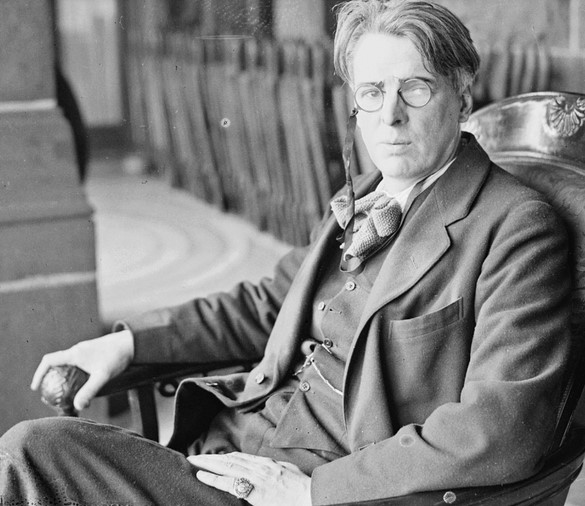The Second Coming

(Poet William Butler Yeats, 1865-1939. Image courtesy Wiki).
We have to ask your indulgence this morning. Not that we don’t incur your debt on that count regularly, and all we wanted to do was showcase one of the extraordinary works of Irish-British poet William Butler Yeats. We will keep this appreciation on the ethos surrounding his life through one particularly dark poem he penned.
Let us give you some of the context of W.B’s life. That is him, images above. Our valued contributor Arrias pitched one of the poems in the Yeats canon over the transom at us late yesterday. The old words left us breathless. We had seen the poem in several manifestations across the years- it meant different things depending on the times. They have been ‘changin,’ haven’t they?
So first this morning, here is the literary work from old times to their impact startling impact in these times. We will get to why his times evoke ours in a moment. First:
The Second Coming
BY
WILLIAM BUTLER YEATS, 1919
Turning and turning in the widening gyre
The falcon cannot hear the falconer;
Things fall apart; the center cannot hold;
Mere anarchy is loosed upon the world,
The blood-dimmed tide is loosed, and everywhere
The ceremony of innocence is drowned;
The best lack all conviction, while the worst
Are full of passionate intensity.
Surely some revelation is at hand;
Surely the Second Coming is at hand.
The Second Coming! Hardly are those words out
When a vast image out of Spiritus Mundi
Troubles my sight: somewhere in sands of the desert
A shape with lion body and the head of a man,
A gaze blank and pitiless as the sun,
Is moving its slow thighs, while all about it
Reel shadows of the indignant desert birds.
The darkness drops again; but now I know
That twenty centuries of stony sleep
Were vexed to nightmare by a rocking cradle,
And what rough beast, its hour come round at last,
Slouches towards Bethlehem to be born?
************
Kinda ominous in language, right? But the context of the times that inspired this dark score is remarkable all by itself. “Second Coming” was written only months after the conclusion of the largest and most savage struggle in human history- what they called “The Great War” in their times. The tumultuous events in Yeats’s home country of Ireland are also behind the poem, and to many represented a sign that the Second Coming cannot be far off. Yeats could have added the 21st Century’s sloppy admonition to his of “Hold our beer!”
His life spanned some remarkable times. He was born the year the savage American Civil War ended- in 1865. Most of a million soldiers and civilians perished in the conflict. From that event across the Atlantic his life both bridged and hung above another when he was too old to participate directly as the grim news flowed back from the mud of Flanders and the West Front.
Yeats died in 1939, immediately before the European chapter of the Second Edition of the global conflict that shattered the old Imperial systems and left us ours.
So, the reference points with which Yeats was familiar- to include old soldiers of empire as participants in life, not memories to be contained in old dusty books- are startling in their magnitude.
This poem is alleged to reference the second coming of Our Lord Jesus Christ. The times suggested the aftermath of four years of trench warfare would presage the return. His use of the little town of Bethlehem as a reference point is evocative, considering the emergence of may be particularly applicable to our own times.
The chaos surrounding our impending election has a strange religious aspect we do not fully understand, since there is a new phrase- a new threat- being talked about. It is a thing called “Christian Nationalism.” To the crowd of Old Salts it sounds like a Bureau across the River justifying surveillance of PTA groups as domestic terrorists.
We are going to have a chance to find out exactly who is approaching it from the mist of tomorrow. We hope it is not our tomorrow, you know?
Copyright 2024 Vic Socotra,
Poem W. B. Yeats 1919
www.vicsocotra.com
